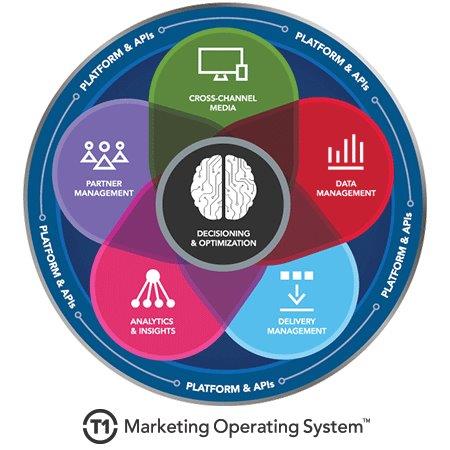 Talking about ‘programmatic’ leads you most probably straight to MediaMath, the company that kick-started the real-time media buying trend in 2007 with the launch of its demand-side platforms (DSP) TerminalOne Marketing Operating System.
Talking about ‘programmatic’ leads you most probably straight to MediaMath, the company that kick-started the real-time media buying trend in 2007 with the launch of its demand-side platforms (DSP) TerminalOne Marketing Operating System.
Top-notch marketers worldwide enthusiastically embraced such platforms swiftly, since DSPs allow advertisers and their agencies not only to bid across a great diversity of publishers, but provide powerful ways to identify and locate specific target audiences. Furthermore, DSPs use sophisticated tools and machine-learning capabilities to automatically optimize advertisers’ spend over time and can even target look-alike audiences to expand reach.These are all winning arguments, considering that marketing is under constant pressure to demonstrate measurable impact to a company’s bottom line, return-on-investment, cost-per-acquisition and other critical metrics. Therefore, the digital marketing industry is glad to see MediaMath’s training arm, the New Marketing Institute (NMI), starting their business in the region.
To get more insights, Asian eMarketing met with Elise James-DeCruise, VP New Marketing Institute, who leads the global team and was in town from New York, as well as Marrah Africa, NMI Certification & Program Lead, APAC/ANZ, who runs the training department in Asia Pacific.
The NMI team seems to be extremely ambitious, enthusiastic and excited to help aspiring marketers and professionals improve their digital marketing proficiency with regards to programmatic techniques and technologies, and looks forward to provide their training. Programmatic is complex, but rewarding
Programmatic is complex, but rewarding
To start with, NMI intends to get all interested in the seemingly-complex world of programmatic up to speed by offering their entire suite of Digital Marketing Certification (‘Digital Marketing 101’ and ‘Programmatic 101’), Omnichannel Certification (Video, Mobile and Social)’ and ‘T1 Platform Certification’ in the region.
The training will enable marketers to drive true outcomes throughout the full customer lifecycle - from brand awareness and engagement to direct response, conversion, loyalty and retention - by learning to ask the right questions, Marrah said.
“Our goal is to be a trusted advisor to the industry. Not just with our clients, but being able to help groups or companies being more confident and comfortable in talking about programmatic. In the end, it is not about what you know about programmatic, but the way you ask questions that matter to you and your business, such as ‘How does it help to achieve ROI? How do I ensure delivering to my perfect audience?”, she emphasized, adding, “Don’t be tempted by the latest trends, instead focus on the fundamentals, such as who is your audience and what are your objectives when navigating through the industry. Be clear of what you want.”
Asked to define her working-definition of programmatic, she said concisely “automation of decision-making and operations with data and technology’. “It’s simple as that, high in demand and here to stay.” Its rapid and broad adoption across channels is a clear indicator that she is right due to its inherent ability to drive performance.
Asked how the institute started, Elise explained: “Initially, it started out as an educational program for clients who were purchasing the technology, which is TerminalOne, but very soon after we realized that there is a bigger need than just training on the product, but industry trends and the evolution of digital marketing as a whole. Right at the beginning, I had my ‘aha-moment’, realizing we are solving a really huge problem within the industry.”
“With the launch of the NMI standard courses in Asia Pacific we want to build the brand now”, Marrah highlighted. “It’s an opportunity for us to become a trusted advisor and to promote that thought leadership and best practices as well as learning solutions.”
As a thought leader in the space, NMI has to ‘to meet the learners where they are’, Elise said, which became eventually the institute’s mantra, always keeping in mind that all learners bring different backgrounds, expertise, experiences, and preferences to the class, which have to be taken into consideration in class.
Fact is that more and more marketers have realized the importance and value of efficient audience targeting enabled by programmatic advertising, and therefore pant for programmatic knowledge. Asia Pacific continues to experience high adoption rates of programmatic, so that NMI’s training offers will definitely be in great demand in the region, where advertisers struggle like everywhere else to keep up with the advances in digital technologies.
Localization is king!
Certainly, the training will have a localized approach that suits the unique cultural nuances of the various markets in the region, starting with in-person classroom training in Singapore and live online courses accessible by all markets.
“Learning styles are different from person to person, region to region, in-person or classroom or remote. Therefore, we are thinking about further localization of content, such as our online videos which already exist in seven languages. We really take it serious. That’s why we look first for experts in the region to help us and strategic partners who share our mission to generate the next marketing experts” Elise affirmed.
Marrah, who has chosen the career path of being a NMI trainer added: “You have to be comfortable to be uncomfortable and be able to put your ego aside, embracing change and be a curious learner. We acknowledge cultural differences, such as how Asians usually participate in a conversation, as we want to see the sessions interactive and engaging without making attendees feel uncomfortable. Besides, we try to provide an environment where people are excites about the opportunities and not intimidated, and we are focused on collaboration and knowledge sharing across departments within companies, agencies or brands to accelerate the conversation not only around programmatic and the technology, but about learning within the space.”
NMI’s courses are modular designed to meet learners wherever they are in their career and taught by instructors who have real-world experience in digital marketing and the technology that underpins it. According to Elise, more than 9,000 professionals have been trained globally already and the courses in the region will be highly topical, local, and relevant.
By Daniela La Marca


